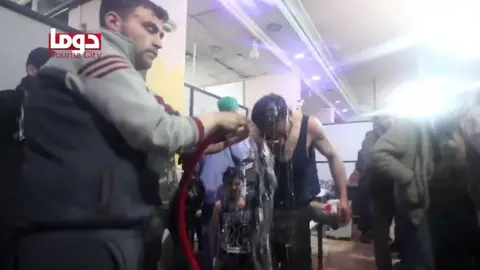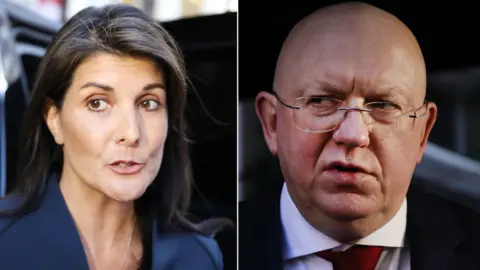Syria war: WHO demands access to 'chemical attack site'
 AFP Photo/ HO/ Douma City Co-Ordination Committee
AFP Photo/ HO/ Douma City Co-Ordination CommitteeThe World Health Organization (WHO) has demanded "unhindered access" to Douma in Syria to check reports from its partners that 500 people were affected by a chemical attack there.
The Syrian government denies being behind any use of chemical weapons.
The US has threatened a "forceful" response to the reported attack but Russia has called it a pretext to attack its ally, Syria.
The WHO cited reports that 70 people had been killed.
It said its "health cluster" partners reported that 500 people had suffered symptoms consistent with exposure to toxic chemicals, including difficulty breathing, irritation of mucous membranes, and disruption to the central nervous system.
"Two health facilities were also reportedly affected by these attacks," the WHO statement continued.
"We should all be outraged at these horrific reports and images from Douma," said Dr Peter Salama of the WHO. "WHO demands immediate unhindered access to the area to provide care to those affected, to assess the health impacts, and to deliver a comprehensive public health response."
What happened in Douma?
Syrian opposition activists, rescue workers and medics allege that an attack on Douma in the Eastern Ghouta region near Damascus on Saturday was carried out by government forces using bombs filled with toxic chemicals.

It said this included breathing difficulties, bluish skin, foaming mouths, corneal burns and "the emission of chlorine-like odour".
The estimates of how many people died in the suspected chemical attack range from 42 to more than 60 people.
The French representative at the UN Security Council said poison gas had deliberately been used as it could seep down into basements.
Following the alleged attack, Syria and Russia reached an evacuation deal with the Jaysh al-Islam rebels, who up until now have been holding Douma.
What will happen next?
It seems the US and its allies may be preparing for a military strike.
US President Donald Trump cancelled his first official trip to Latin America so he could focus on Syria.
That decision suggests the US response may involve a larger military operation than a limited strike, says the BBC's Barbara Plett Usher in Washington.
Washington has also been in discussion with France and the UK, raising the prospect of co-ordinated Western military action.
French President Emmanuel Macron said any strikes would target Syrian government chemical facilities.
But The Times reports that the UK's Prime Minister Theresa May has urged Mr Trump to provide more evidence of the suspected chemical attack.
A US Navy guided-missile destroyer, the USS Donald Cook, is in the Mediterranean, and the European air traffic control agency, Eurocontrol, has warned airlines to take "due consideration" while in the eastern Mediterranean over the next few days, because of the possible launch of missiles into Syria.
Several senior Russian figures have warned of a Russian response to a US attack.
Alexander Zasypkin, Moscow's ambassador to Lebanon, was the latest, repeating a warning by the head of the military that missiles would be shot down and their launch sites targeted.
Moscow's UN ambassador warned Washington that it would "bear responsibility" for any "illegal military adventure" it carried out.
What is the UN doing?
On Tuesday the UN Security Council failed to pass any measures to set up an inquiry into the alleged attack.
As permanent members of the council, Russia and the US both have the power to veto. They both blocked each other's proposals to set up independent investigations.
The US-drafted resolution would have allowed investigators to apportion blame for the suspected attack, while Russia's version would have left that to the Security Council.
A team from the Organisation for the Prohibition of Chemical Weapons (OPCW) is due to deploy to Syria "shortly" to determine whether banned weapons were used in Douma.
But the OPCW will not seek to establish who was responsible for the attack.
 Getty Images
Getty ImagesThe UN session was the latest in a series of showdowns between Russia and the US and saw harsh words exchanged between the countries.
Russian ambassador Vasily Nebenzia accused the US of "planting" a resolution" as a justification for military action.
"We could find ourselves on the threshold of some very sad and serious events," he said.
US envoy Nikki Haley responded by calling the vote a "travesty".
"Russia has trashed the credibility of the council," she said. "Whenever we propose anything meaningful on Syria, Russia vetoes it."
